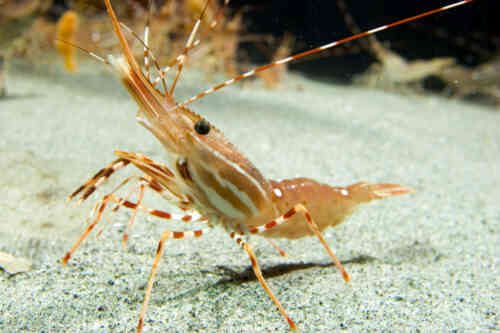Shrimp — creatures are amazing and extremely tenacious. They are constantly devoured by other marine life, and people catch them in tens of thousands of tons, but at the same time, shrimps in the seas and oceans do not become less due to their fertility. By the way, eating them is very healthy — that’s a fact too.
Interesting facts about shrimp
- Shooting shrimp are able to click their claws, emitting a sound with a power of 218 decibels, which is comparable to the signals of roaring whales. The deafening click allows the shrimp to kill small fish that are nearby and feed on them.
- The body size of adult shrimp varies from 2 to 30 cm.
- Shrimps inhabit the seas all over the world, and some species of these creatures have adapted to life in fresh water (interesting facts about the seas).
- Many species of shrimp are born as males, and as they mature, they gradually transform into females.
- Shrimp meat is a low-calorie product rich in vitamins, protein and calcium. They are also rich in cholesterol, the amount of which, depending on the method of preparation of shrimp, can reach up to 250 mg per 100 g.
- Chinese artist Qi Baishi became famous for his masterful depiction of shrimp (interesting facts about China).
- A species of shrimp that lives off the coast of Panama was named after the rock band Pink Floyd – one of their claws is much larger than the other and has a purple-red color.
- Shrimps were eaten with pleasure by the ancient Greeks – however, they did not boil them, but baked them on fire.
- The record holder among shrimp in terms of body size is black tiger shrimp. They can grow up to 36 cm and weigh 650 g.
- The numbers indicated on the shrimp packages (for example, 100/120) are the number of shrimp in one kilogram.
- Store-bought shrimp with orange shells do not need to be boiled – they are already ready, so they only need to be thawed and, if necessary, warmed up by throwing them in boiling water for a couple of minutes.
- If the shrimp shell is thin and soft to the touch, this does not mean that the crustacean had health problems. Shrimps constantly shed shells that have become too tight to be replaced by a new shell. For some time after molting, the shell remains fragile and almost transparent, but then it acquires the necessary strength.
- The nucleus of each cell in the body of a shrimp contains 90 pairs of chromosomes (in humans, by comparison, there are 46).
- The heart of the shrimp is not in the chest, but in the head of the crustacean.
- Sea shrimp eggs can survive the drought without damage – the eggs will dry out, but will be reborn immediately after falling into the water, and soon offspring will appear from them.
- Shrimps activate the metabolism, so they are included in many diets for those who want to lose weight. In addition, they improve the functioning of the endocrine system, the condition of the skin, hair and nails.
- The sounds that shrimp make are extremely dangerous for submarines – if a cluster of these creatures is close to the submarine, the sonar transmits incorrect information about objects in that direction.
- Shrimps only need to cook for a few minutes, otherwise their meat will become rubbery and tasteless.
